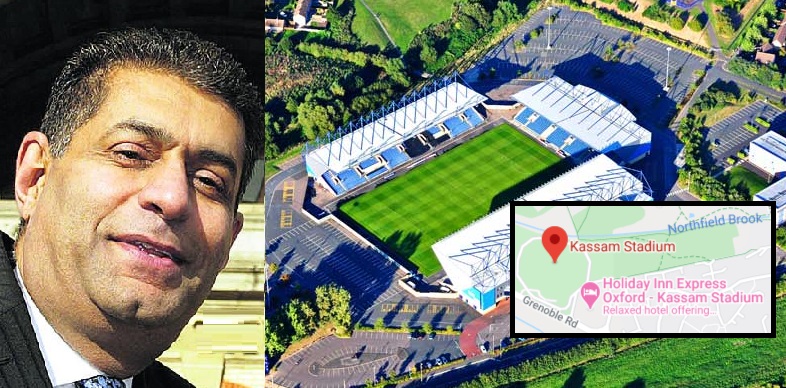Firoz Kassam was born in Tanzania, one of five children. His father had a small confectionery business, and his mother died when he was a child. They migrated to England when he was 19.

His father had a small confectionery business where as a child he had to share responsibility for his younger brothers and sisters.
He found his first job in an Indian take-away food shop in south London. There he washed plates and cooking utensils. By 1970, he had opened his own fish and chip shop in Brixton.
The shop was successful and Firoz Kassam was able to borrow money to rent a building with twenty rooms in the Olympia district of London.
Initially, he attempted to operate the building as a cheap ‘bed and breakfast’ hotel. This was unsuccessful, but fortunately the local authorities in London were looking for cheap accommodation in London for ‘homeless’ families.
Firoz Kassam was able to supply this service. Through the success of this ‘bed and breakfast’ hotel, Firoz Kassam was able to obtain further loans from banks to rent more properties and open more hotels.
By the mid-1980s Firoz Kassam controlled eighteen cheap hotels in south London and he was planning to move up-market by constructing a luxury hotel.
Mount Pleasant Hotel near King’s Cross, which he owned in the 1980s. This place, once described as a “hellhole”, was home to 700 people who had been placed there by social services officials.
Several London councils were paying Mr Kassam around [pounds sterling]60,000 a week to put a roof over the head of some of London’s most unfortunate.
He bought the 740-room London Park Hotel at the Elephant and Castle. It was doing quite well as a tourist hotel in the late 1990s, then Mr Kassam spotted another opportunity.
The Home Office was spending £40 million a year on housing a growing number of asylum seekers. The London Park Hotel soon closed its books to tour companies and became a hostel for refugees.
It attracted a rather unsavoury reputation and is to be redeveloped. Mr Kassam, it might be said, has already undergone this process.
In the 1980s he was labelled a “merchant of misery” over his slum hotel enterprises, but today he is the esteemed proprietor of some of the finest real estate in the land. …
Through the 1990s his group of hotels developed and Firoz Kassam was constantly expanding. He bought an estate in Oxfordshire and converted it into a luxury country hotel and conference centre. Then in the late 1990s he bought control of Oxford United Football Club.
He owns a family home in a 20-bedroomed house at Heythrop Park, one of southern England’s most beautiful
Today some people referred to him as a hotelier, others; a slum landlord. Kassam’s money came from providing accommodation for asylum seekers and other vulnerable people. The authorities paid him tens of thousands of pounds a week to keep them in such poor conditions; they – some of the most needy people in the country – eventually rebelled.
From this difficult start he has become a leading player in the London hotel market, though in the early 1990s he nearly went under with high borrowings when the banks pulled the rug from under his feet and he lost all his hotels bar one his giant Kings Cross hotel.
The first thing is that being rich is hard work, there’s an idea that somehow rich people haven’t worked for what they have whereas poor people work hard and get nothing. When you work hard, you usually feel you deserve something for it; a beer, a million pounds, your bodyweight in chocolate. Firoz Kassam undoubtedly thinks he deserves reward for his financial success. But, hard work alone does not make you rich. Lots of people work hard and don’t get rich. There are lots of other factors, many out of your control, which help you get rich.
Firoz Kassam, who made his money in the 1980s by housing asylum seekers in London hostels, is buying the “Hornbeams” estate in Hampstead.
In 1999, Kassam bought Oxford United F.C. for £1, also taking over its debts estimated to be in the region of £13m. In 2000, he resumed building a 12,500-capacity stadium at Minchery Farm on the edge of Oxford, which he called the Kassam Stadium.
Kassam sold the football club in 2006, but retained ownership of the stadium through his company Firoka with Oxford United (and later also London Welsh RFC) as tenants.
The Kassam Stadium (also known as Grenoble Road) is the home of Oxford United Football Club, and is named after the ground’s owner and former chairman of the football club, Firoz Kassam.
Kassam also owns the historic mansion and grounds of Heythrop Park which he purchased in 1999 for £15m. The site underwent a £50 million rebuilding programme and has been developed into a luxury hotel and spa with an 18-hole championship golf course and restored landscape gardens.
In August 2005, he purchased Studley Castle in Warwickshire, a hotel and conference centre formerly owned by Phoenix Venture Holdings, the consortium who owned carmaker MG Rover from 2000 until 2005.
In 2007, his net worth was estimated at £240 million.[8] In the 2017 Sunday Times Rich List, his net worth was £315 million. He was listed as the UK’s wealthiest in the Sunday Times’s Rich List 2017.
